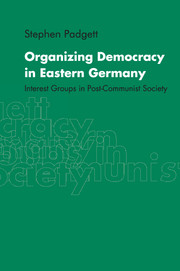Book contents
- Frontmatter
- Contents
- List of tables
- List of abbreviations and glossary
- Introduction
- 1 The emergence of civil society
- 2 Socio-economic foundations
- 3 Organization
- 4 Participation and the logic of collective action
- 5 Group dynamics
- 6 Organized interests, the state and public policy
- Conclusion
- References
- Index
3 - Organization
Published online by Cambridge University Press: 22 September 2009
- Frontmatter
- Contents
- List of tables
- List of abbreviations and glossary
- Introduction
- 1 The emergence of civil society
- 2 Socio-economic foundations
- 3 Organization
- 4 Participation and the logic of collective action
- 5 Group dynamics
- 6 Organized interests, the state and public policy
- Conclusion
- References
- Index
Summary
Interest organization exhibits a striking diversity of structural forms in different national contexts. The range of variation can be expressed in terms of a spectrum from the loose-jointed ‘pluralistic’ interest group system in the United States – ‘untidy, competitive … and very varied’ (Wilson 1993: 139), to the more formally structured, tightly integrated corporatist systems in some of the northern European countries. Cross-national heterogeneity can be explained by different patterns of economic development and corresponding differences in the class configurations from which organized interests emerge. It may also reflect differences in the institutional environment, which shapes the institutional design of the organizational landscape. The fragmentation of the American system, for instance, has been explained by the dispersal of power within the apparatus of the state (Salisbury 1979: 218–20). In short, ‘the characteristics of associational systems … are deeply influenced and determined by the socio-economic and political history of each single country’ (Lanzalaco 1992: 199–200).
The centralized, hierarchical design characteristic, as we have seen, of corporatist systems is unlikely to emerge spontaneously in the early stages of democratic transformations. Corporatist design is associated with sharply defined and cohesive class formations. With its social structures as yet ill defined, post-communist society is likely to generate a more fragmented spectrum of interests, reflected in interest group systems which approximate more closely the more untidy and varied pattern of the pluralist design.
- Type
- Chapter
- Information
- Organizing Democracy in Eastern GermanyInterest Groups in Post-Communist Society, pp. 73 - 97Publisher: Cambridge University PressPrint publication year: 1999



